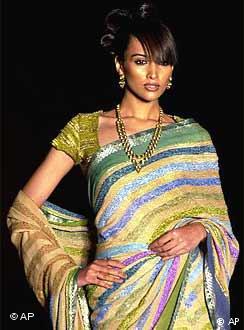Cultural appropriation – the muse for the fashionably forward?

German actress Stephanie Stumph during a film production in India (2012).
A few months ago, a white South African friend of mine went to India. She asked me how I would feel if she wore a sari (traditional dress for many Indian women) there. I was somewhat indifferent and wondered why she was asking me since I was not even in India. Since she was there, why shouldn’t she wear a sari, I thought. People from other cultures have worn it for years and I’m always pleasantly surprised by how much more welcome they are in Indian circles when they do wear traditional dress.
She then brought up the topic of cultural appropriation, which is the exploitation of a minority group’s culture by a dominant group, which sometimes shows ignorance of the historical or cultural experiences of that minority group. For instance, when the Kardashians flaunted their cornrows and appeared fashionably forward, many people of color were not impressed, insisting that they were profiting from African American cultural trends. But I love the fact that the Kardashians have made it possible to enjoy having a curvy body without having to feel fat.
I have to admit that when my friend told me about cultural appropriation, my first thought was that it was a reflection of ridiculous academic discourse. I grew up in a multicultural society; a melting pot of various cultural identities. I don’t identify with all things Indian.

An Indian model presents a colourful Sari during Satya Pal Collection Spring/Summer 2003 fashion show in Bombay, India
Now that I’m living in Germany, I am often asked if I’m from India. But as a South African, I relate more to being South African and enjoying things that are inherently African. Since marrying a German, I am also embracing my husband’s German cultural identity. During Karneval, I am happy to wear traditional German dress such as the Bavarian dirndl. Recently there was talk of advocates representing Indigenous people who have requested the UN to make cultural appropriation illegal in the areas of fashion. I can understand this to a certain extent because when cultural appropriation is used to profit from an indigenous culture without the historical context being respected, it can be demeaning.
But I also know that this will not stop cultural appropriation because who is the right person to ask for consent regarding the use of one’s cultural symbols. Most women at some point in their lives have all been inspired and influenced by cultures other than our own. We have all borrowed or adopted fashion trends, food recipes, traditional healing methods, music and even religion from cultures that are largely foreign to us, but have somehow become part of our own identity or daily routines. Can you imagine all those women who are not of eastern origin asking for consent to practise yoga?
Cultural appropriation in the realm of fashion may very well seem like cultural ignorance of a minority group, but it can also open up a discussion on what can be learned from a particular culture. While it is necessary to protect the rights of indigenous minority groups, it is also important not to build walls so high that we do not make it possible for cultures to embrace and adopt each other’s fashion, food, music, and differences. By doing so, we can learn to connect with each other, and build deeper and more meaningful relationships with people of foreign cultures who might otherwise be invisible to us.
Would I have been offended if my friend wore a sari without asking my permission? Not at all. No matter how many fashion trends she tries to adopt from India, I know that she will never know what it is exactly to be me or any other Indian person. But that’s perfectly OK.
I love the fact that she tries to understand and embrace cultures that are not her own. When you grow up in a multicultural society, it’s hard to ignore other cultures and only focus on your own. If sharing is caring, then we should share our ‘toys’ with each other and learn to make this circle bigger, instead of holding onto parts of our cultural identity that inevitably will be subjected to transformation on a global scale. Change is happening constantly all around us; in some places it maybe slower than others.
Embrace it!
Author: Sarona Wolter
Editor: Anne Thomas, Brenda Haas
_____
WTO RECOMMENDS
The Proudly South African Kangamama
Ashle Skaftouros is a phenomenon. After meeting the founder of Kangamama, you simply cannot forget her. She is the poster child of a beautiful African woman. Her a little crazy, a bit cheeky, but always inspiring attitude causes a shift in the atmosphere around her. At least, this is the impression I got when I first encountered her many years ago. She stood out as someone who was destined to make a difference in her world.
The expat wife: ‘What every women needs to know before she marries a foreigner.’
I just knew I had to follow the smile in his golden eyes into the sunset. It involved jumping on a plane, while barely knowing the inner workings of his soul or where on Google’s map he lived. It involved a great deal of bravery, a trusting heart, money I wasn’t sure I had, faith the size of a mustard seed and a spirit of adventure.
Be bold for change
When I heard about the theme for Women’s Day this year, ‘Be bold for change,’ I thought, ‘Oh, wow that’s so cool.’ Actually, that’s my general reaction to most things. But then I gave it more thought, especially about how change has affected my life, world politics and just about everything.






